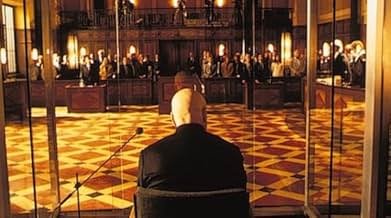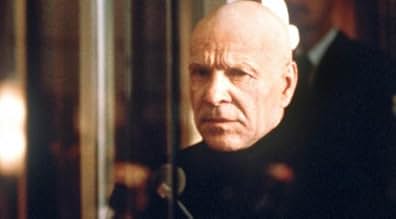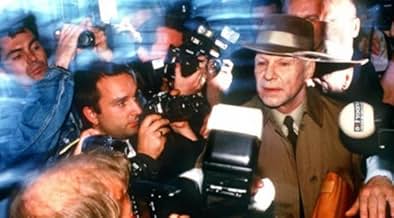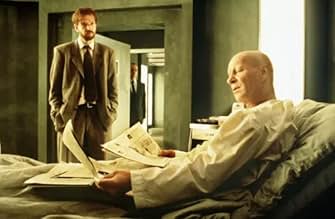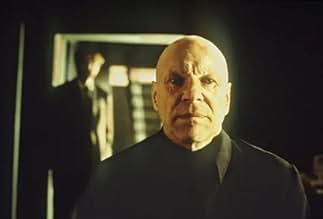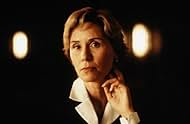Der berühmte Nazi-Arzt Dr. Josef Mengele - der "Todesengel von Auschwitz", der mehr als 300.000 Menschen tötete - kehrt als 87-jähriger Mann aus seinem Versteck in Argentinien nach Deutschla... Alles lesenDer berühmte Nazi-Arzt Dr. Josef Mengele - der "Todesengel von Auschwitz", der mehr als 300.000 Menschen tötete - kehrt als 87-jähriger Mann aus seinem Versteck in Argentinien nach Deutschland zurück.Der berühmte Nazi-Arzt Dr. Josef Mengele - der "Todesengel von Auschwitz", der mehr als 300.000 Menschen tötete - kehrt als 87-jähriger Mann aus seinem Versteck in Argentinien nach Deutschland zurück.
- Auszeichnungen
- 1 Gewinn & 4 Nominierungen insgesamt
Empfohlene Bewertungen
The story of Nazi collaborators being brought to justice would not seem interesting anymore in these days, even with the emergence of extreme Nationalistic tendencies in several places out of Germany, but Roland Suso Richter made an intelligent and moving drama, based on a fantasy. Suppose that "The Angel of Death of Auschwitz", Dr. Josef Mengele (who never faced German justice and died in Brazil) had come back to Berlin, selected a bright young lawyer (Peter Rohm) for his defense, and asked to be judged to set the facts straight, or to put it in his words, "to let the Truth be known". The lawyer's only strategy is to interpret Mengele's actions under the medical ethics of his time, and in a way he succeeds to prove that Mengele was just acting according to the common notion in Nazi Germany, that doctors could and should dispense of lives that weren't worth-living. But there's more to it. Although the script (by Johannes W. Betz and Christopher and Kathleen Riley) makes a fine tapestry of past and present (and includes a disturbing final speech by Mengele) and the camera-work by Martin Lager is first rate, director Richter does not incurs in flashy style. His mise-en-scene is elegant and confident, immensely helped by the excellent performances by Götz George as Mengele and Kai Wiesinger as Rohm.
This film is absolutely wonderful. Not in the way that it makes you feel good, oh no! It seduces you to try to understand the deeds of one of the most famous and feared Nazis ever: Dr. Josef Mengele. It leads you to the point where you have to declare where your own point of view is located without offering the easy way out...
This film is not making efficient use of the "what if" idea of Mengele's return from exile to stand trial for his Auschwitz crimes in order to explain his motives, but it's a stellar lesson in character acting by Götz George. He also co-produced the film because few wanted to be associated with this content, and while reception outside Germany was positive, it was vehemently criticized in the country for giving Mengele a human side. George gives his best performance next to his tour de force as Fritz Haarmann in "The Deathmaker" (1995). He had also portrayed Auschwitz camp commander Rudolf Höss in "Death is my Trade" (1979), and his father was Nazi collaborator actor Heinrich George who died in Sachsenhausen after the Russians repurposed the camp.
The film came out after Goldhagen's book "Hitler's willing Helpers" caused a moralistic frenzy which still dominates German politics 25 years later and has been dwelt upon in documentaries ever since. The static courtroom dynamic neutralizes the horrific crimes described, and the film would be much stronger if it maintained emotional distance. Unfortunately a sappy soundtrack trivializes the witness statements and the script lapses into sentimentality, but one cannot expect else from director Richter, who rose to fame with romantic comedies.
The weakest point of the film is that Mengele's special relationship with racial biology as the medical advisor of Auschwitz's Gypsy camp is not mentioned. There is testimony of Sinti survivors in the 2011 documentary "A People uncounted" which clearly proves that Mengele enjoyed torturing children, and the definitive monography on the Gypsy Holocaust "Racial Utopia and Genocide" was available at the time. While there is a lot of historical context in the script, but that makes it all the more clear that the writers did not know that particular book, which is a ruesome oversight (as is the silence on Birkenau B in general).
So this is definitely worth seeing for Götz George, one of the most underrated German actors, but neither the director nor the screenplay make full use of the film's premise. Particularly the ending is a disappointing descent into kitsch.
The film came out after Goldhagen's book "Hitler's willing Helpers" caused a moralistic frenzy which still dominates German politics 25 years later and has been dwelt upon in documentaries ever since. The static courtroom dynamic neutralizes the horrific crimes described, and the film would be much stronger if it maintained emotional distance. Unfortunately a sappy soundtrack trivializes the witness statements and the script lapses into sentimentality, but one cannot expect else from director Richter, who rose to fame with romantic comedies.
The weakest point of the film is that Mengele's special relationship with racial biology as the medical advisor of Auschwitz's Gypsy camp is not mentioned. There is testimony of Sinti survivors in the 2011 documentary "A People uncounted" which clearly proves that Mengele enjoyed torturing children, and the definitive monography on the Gypsy Holocaust "Racial Utopia and Genocide" was available at the time. While there is a lot of historical context in the script, but that makes it all the more clear that the writers did not know that particular book, which is a ruesome oversight (as is the silence on Birkenau B in general).
So this is definitely worth seeing for Götz George, one of the most underrated German actors, but neither the director nor the screenplay make full use of the film's premise. Particularly the ending is a disappointing descent into kitsch.
9hng
*No spoilers, all infos included in advertisings to the movie*
This movie is a very brave attempt to ask difficult questions in an unfashionable way. Dr. med. Josef Mengele, the name alone may cause shiver in ones mind. The 'Deathangel of Auschwitz', the beast, a monster, a man!? Richter story actually starts with the doctor arriving in Germany, admitting all he has done... pleading NOT guilty due to the circumstances of his time.
Hardly to believe you might think... so did I, 'till I saw the movie, 'till I heard the argumentation... The movie is no accusation of a political system, a period of time itself, or a single person, it's not even actually a typical 'what-if'. It, too, is no justification for either side. It simple asks the question whether a murder of thousands can be judged or if this is just a little bit out of scale for current laws and minds. If one man was guilty in the past, aren't we all in the present?
The international affect of the topic is too little present. The thriller elements are (IMHO) superfluous and the REAL interesting questions could be more deeply evolved. But nevertheless this movie is worth a ticket or to. Gets a 9/10! I took deep impacts in my conscious... got me troubled.
"If you put aside all answers as lies, still the question remains."
This movie is a very brave attempt to ask difficult questions in an unfashionable way. Dr. med. Josef Mengele, the name alone may cause shiver in ones mind. The 'Deathangel of Auschwitz', the beast, a monster, a man!? Richter story actually starts with the doctor arriving in Germany, admitting all he has done... pleading NOT guilty due to the circumstances of his time.
Hardly to believe you might think... so did I, 'till I saw the movie, 'till I heard the argumentation... The movie is no accusation of a political system, a period of time itself, or a single person, it's not even actually a typical 'what-if'. It, too, is no justification for either side. It simple asks the question whether a murder of thousands can be judged or if this is just a little bit out of scale for current laws and minds. If one man was guilty in the past, aren't we all in the present?
The international affect of the topic is too little present. The thriller elements are (IMHO) superfluous and the REAL interesting questions could be more deeply evolved. But nevertheless this movie is worth a ticket or to. Gets a 9/10! I took deep impacts in my conscious... got me troubled.
"If you put aside all answers as lies, still the question remains."
When I saw AFTER THE TRUTH I was absolutely spellbound. Such a monstrous, though in fact, quite simple idea could actually be turned into a film? In Germany? Never! The fact stands that this is a brave and well crafted study of a man's choice between professional opportunity and his personal ethics. Forced to defend The Angel Of Death - Dr. Josef Mengele - his personal life is, understandably, completely turned upside down. The script by Johannes W. Betz manages to alternate convincingly between scenes portraying his inner turmoil and the fascinating encounters with Dr. Mengele. Götz George as Mengele is excellent and it is largely through his brilliant performance that the story is so fascinating and believable. The ending of the film felt a bit like a copout to me but the clever editing and the accomplished direction by Roland Suso Richter never falter. After living in fear that the German cinema was dead and buried, there appears to be new blood to bring it back to life.
Top-Auswahl
Melde dich zum Bewerten an und greife auf die Watchlist für personalisierte Empfehlungen zu.
Details
Zu dieser Seite beitragen
Bearbeitung vorschlagen oder fehlenden Inhalt hinzufügen


